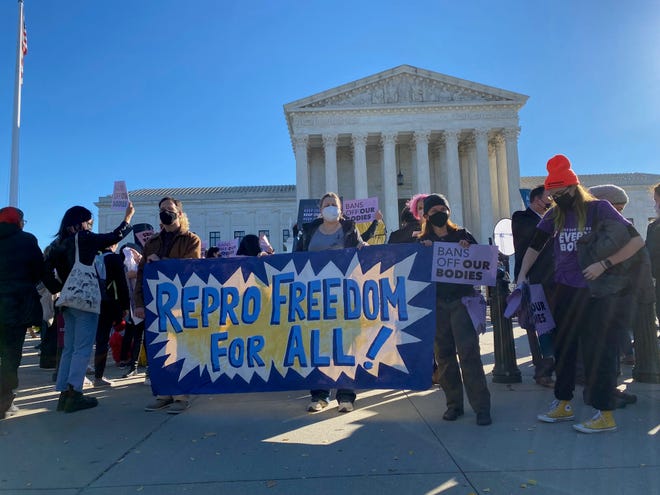
WASHINGTON – Oral arguments concluded Monday at the Supreme Court in a pair of challenges to Texas' ban on abortion after six weeks of pregnancy, a law that has galvanized forces on both sides of one of the nation's most bitter cultural conflicts.
The high court finished its hearing after three hours of oral arguments and question-and-answer sessions with attorneys representing abortion providers, the state of Texas, the Biden administration //and some private citizens also involved in one of the cases//.
Though the high court has limited its focus to procedural questions about whether the two lawsuits may go forward – and whether enforcement of the Texas law should be temporarily put on hold – the arguments will be closely scrutinized for clues about the justices' positions on the constitutionality of abortion.
In the first of the two cases the high court heardon Monday, the justices' questions mostly fell along procedural lines. An attorney representing abortion providers argued that the law would turn a provider into a "permanent defendant."
“Texas delegated enforcement to literally any person anywhere except its own state officials," said Marc A. Hearron, the attorney for the providers. "The only conceivable reason for doing so was to evade federal court review."
Allowing the law to stand, he said, would give other states a "roadmap" to write laws that skirt Supreme Court decisions.
Associate Justice Brett Kavanaugh questioned whether the Texas law would allow for states to write similar laws that infringe other constitutional rights, such as gun rights guaranteed by the Second Amendment. A gun-rights group filed a brief supporting the abortion clinics because it fears similarly structured laws would limit its ability to ask courts to block gun restrictions approved in Democratic states.
Kavanaugh cited a hypothetical law that would allow the seller of an AR-15 to be sued for $1 million.
The attorney representing Texas in the case brought by abortion providers acknowledged that possibility, saying the state's position “does not turn on the nature of the right.” In those cases, Texas Solicitor General Judd E. Stone said those who might face restrictions because of any such state laws could turn to Congress for new fe laws to protect their rights or for additional avenues to get into federal court.
After about 90 minutes of arguments in the case brought by abortion providers, the court turned to the Biden administration's lawsuit.
Newly sworn-in Solicitor General Elizabeth B. Prelogar described the Texas law as a "brazen attack" on the branches of the federal government during her opening remarks.
"It’s an attack on the authority of this court to say what the law is and to have that judgment respected across the 50 states," Prelogar said.
Prelogar said the federal government’s position on a state law that circumvents review by the federal courts would be the same whether the law targeted abortion rights, gun rights or other constitutional rights.
“It would be exactly the same because the threat here is to the supremacy of federal law,” she said.
Arguments began at 10 a.m. and were streamed on the court's website The audio is also available via C-SPAN.org.
Abortion already featured prominently on the court's docket this year after the justices agreed to hear a lawsuit over Mississippi's ban on the procedure after 15 weeks of pregnancy. Attorneys for the state have explicitly asked the court to overturn its landmark 1973 ruling in Roe v. Wade that established the constitutional right to end a pregnancy.
But the Texas law, by far the most restrictive of its kind in the USA, rocketed ahead of Mississippi as a series of federal court decisions kept it in place. The Supreme Court agreed to hear both suits challenging the Texas law – one filed by abortion clinics, the other by the Biden administration – on an expedited schedule.
More:Supreme Court declines to block Texas abortion law over Sotomayor dissent
More:Justice Thomas celebrates 30 years on a Supreme Court that is moving his way
The U.S. Court of Appeals for the 5th Circuit allowed the law to stay in effect while courts hash out the underlying constitutional questions. That has prompted many Texans seeking the procedure to cross state lines.
"Women with sufficient means are being forced to travel to other states to obtain pre-viability abortion care – causing chaos and backlogs at clinics in other states, and delaying abortions by weeks," the federal government told the high court in its appeal.

The Texas law bans abortions once cardiac activity is detected in an embryo, usually around six weeks and before many women know they're pregnant. That timeframe is well before the standard set by the Supreme Court in a 1992 decision in which the justices said people are entitled to the procedure until the point of viability when a fetus can survive outside the womb, or about 24 weeks of pregnancy.
But it's not clear that the high court will deal with whether the law is constitutional, at least for now. When they decided to hear the Texas suits this month, the justices limited the discussion to whether the Biden administration, the state of Texas and a number Texas of officials are the proper parties to sue or be sued.
Kaitlan Abrams, 25, traveled from Brooklyn, NY, with Housing Works, a health care and anti-poverty advocacy group, to oppose the Texas abortion law.
“The truth is that if abortion isn't legal, people are still going to get abortions and they're going to do them in unsafe, illegal, criminalized ways,” Abrams, 25, told USA TODAY.
Texas state Sen. Bryan Hughes defended the use of private citizens as the enforcement mechanism for the Texas abortion law. Hughes was hopeful that the mechanism used by the Texas law, which he wrote, to stop abortions would be adopted by other states across the country.
“We believe other states can do what we've done,” he said. “States are laboratories of democracy and we learn from other state’s mistakes and what we get right. We definitely believe other states will look at this and we can work together.”
Rather than criminalizing abortions after six weeks, the Texas law incentivizes citizens to sue anyone in state court who helps a person end their pregnancy. That has made it harder for abortion rights groups preemptively to block enforcement of the law – since it's not clear who is enforcing it before such cases are brought in state court – and raises questions about what role federal courts have in the dispute.
"Texas does not cause the United States injury by the mere existence of an allegedly (unconstitutional) state law that may affect private parties," Texas told the court in a brief last week. "Not even the United States can obtain an advisory opinion on the constitutionality of Texas’s law by suing Texas."
In other words, according to Texas, the Biden administration can't ask the Supreme Court to step in because the federal government isn't harmed by the law.
The Supreme Court ruled in Texas' favor once before, deciding in September that it would not put enforcement of the law on hold because, a majority said, abortion providers had not sued the correct parties. That ruling prompted a backlash on the left and polls showed tanking support for the high court among Democrats.
It's not clear when the court will rule this time around. Major controversies are often decided in early summer but the court picked up the pace considerably with both Texas cases. Experts predict the justices will want to bring closure to the Texas dispute before turning to Mississippi's 15-week ban.
Oral arguments in that case are Dec. 1.
Contributing: Matthew Brown
Source link









